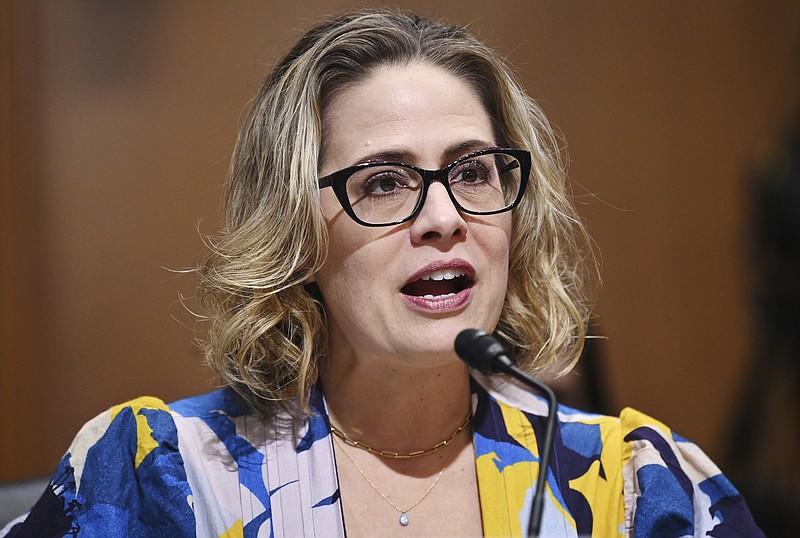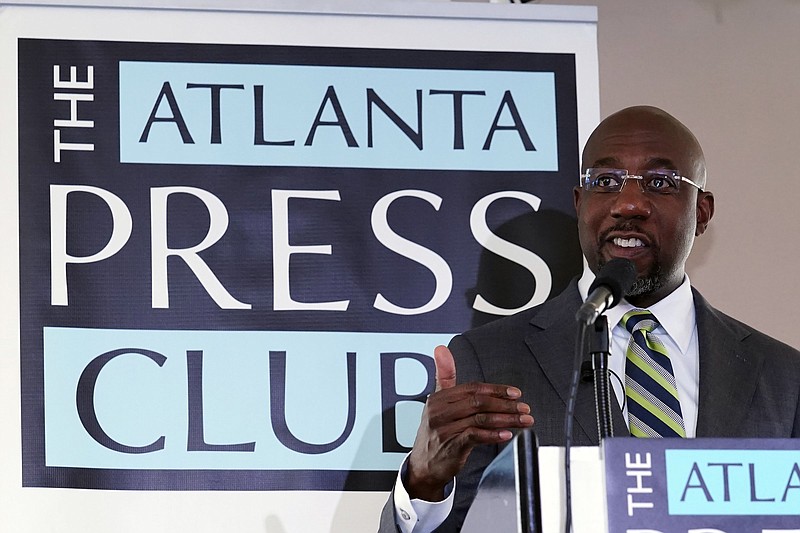WASHINGTON -- Democrats' drive for new federal voting rights legislation hit a new roadblock Wednesday, with options for progress dwindling as Senate Republicans remain united in blocking debate on the issue.
Key lawmakers and advocates have continued to elevate the political stakes, calling federal legislation essential to protecting American democracy from the efforts of Republican state legislatures and election officials to restrict voting access after former President Donald Trump's claims of fraud in the 2020 presidential election.
"If there's anything worthy of the Senate's attention, if there's any issue that merits debate on this floor, it's protecting our democracy from the forces that are trying to unravel it from the inside out," Senate Majority Leader Charles Schumer, D-N.Y., said Wednesday.
But the realities of the Senate -- with a razor-thin Democratic majority and a united Republican minority empowered by the long-standing filibuster rule requiring a 60-vote supermajority to advance most legislation -- continue to make progress difficult and wholly dependent on the willingness of key Democratic senators to change their views on modifying the Senate's rules.
Wednesday's vote, which would have paved way for a floor debate on voting rights, failed 51 to 49, with 60 votes needed to advance the legislation. For procedural reasons, Schumer joined all 50 Republicans in voting no. The vote was meant, in part, to demonstrate the depth of the Republican opposition to one of those senators, Sen. Joe Manchin, D-W.Va., who played a leading role in crafting a narrower alternative to the sprawling bill that Senate Republicans blocked in June.
[Video not showing up above? Click here to watch » arkansasonline.com/1021mcconnell/]
The new bill, called the Freedom to Vote Act, keeps some provisions of the earlier bill, including national standards for early voting and vote-by-mail, new disclosure requirements for "dark money" groups and the establishment of Election Day as a federal holiday. But it also discards or scales back controversial provisions such as a reworking of the Federal Election Commission, a new public financing system for congressional elections and a mandate for nonpartisan redistricting commissions. It also omits revisions to the ethics regime for federal officeholders.
The procedural vote Wednesday comes after Manchin spent the past month wooing Republican colleagues -- including Senate Minority Leader Mitch McConnell, R-Ky. -- to support it. Yet no Senate Republican emerged before Wednesday to support the bill.
McConnell on Wednesday said the GOP remains steadfastly against any federal legislation and accused Democrats of trying to "truss up the same takeover with new trappings."
"The same rotten core is all still there," he said, denouncing provisions of the bill that would impose new federal mandates on state election practices.
Now Manchin is facing new pressure to sketch out a path around the continued Republican opposition -- the culmination of a months-long process designed by Democratic leaders to demonstrate that there is no bipartisanship to be had on the voting rights issue.
"Joe Manchin has been given all summer to both draft and negotiate this bill," said Meagan Hatcher-Mays, director of democracy for the Indivisible network of liberal activists. "He is the one who holds the key as to whether or not this bill will actually pass. So the question for Joe Manchin [Wednesday] is, are you going to show more loyalty to our democracy and our country? Or are you going to show more loyalty to an arcane Senate rule that is arbitrarily blocking your own legislation from being passed?"
Sen. Raphael Warnock, D-Ga., who faces reelection next year in a state where GOP legislators have tightened voting laws, put it more diplomatically Tuesday.
"He understands the importance of this, and tomorrow is the next step in a process," he said Tuesday. "It's urgent. The clock is ticking. We need to get this done."
[Video not showing up above? Click here to watch » arkansasonline.com/1021harris/]
Manchin did not comment or release a statement Wednesday on further steps he would support to advance the legislation, and while he has at times signaled openness to changing the Senate rules to encourage debate, he has firmly and repeatedly opposed the elimination of the filibuster.
Meanwhile, Sen. Kyrsten Sinema, D-Ariz. -- who has long supported new voting rights legislation but opposed changes to the filibuster -- has given no indication that she has changed her views. Several other Democratic senators have been less outspoken but still remain wary of eliminating the filibuster entirely while being open to modifications.
Schumer has repeatedly vowed that "failure is not an option" on voting legislation, and he has said Democrats would gather and decide collectively as a caucus on how to proceed with changing Senate rules.
Across the aisle, there appears to be little concern that Manchin or Sinema is at risk of changing their minds to advance voting rights legislation.
McConnell and other Republicans have shown some concern that the moderate duo might move under some circumstances to undermine the filibuster, which has driven decisions by some Republicans to embrace a bipartisan infrastructure deal this summer and to retreat from a high-stake confrontation on the federal debt ceiling earlier this month. But they say they remain confident that neither Democrat will undermine the filibuster to pass voting rights legislation.
"We take him at his word -- the filibuster's safe," said Sen. John Cornyn, R-Texas, of Manchin.

